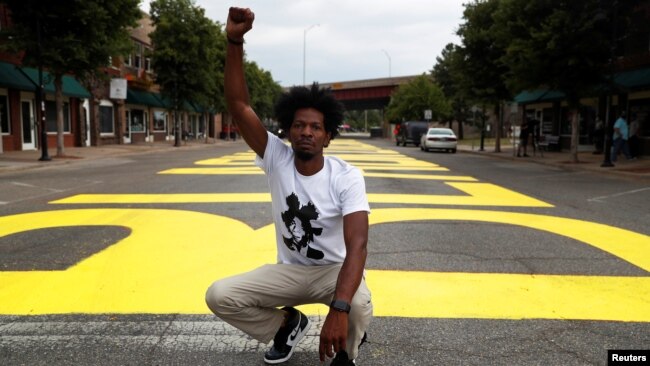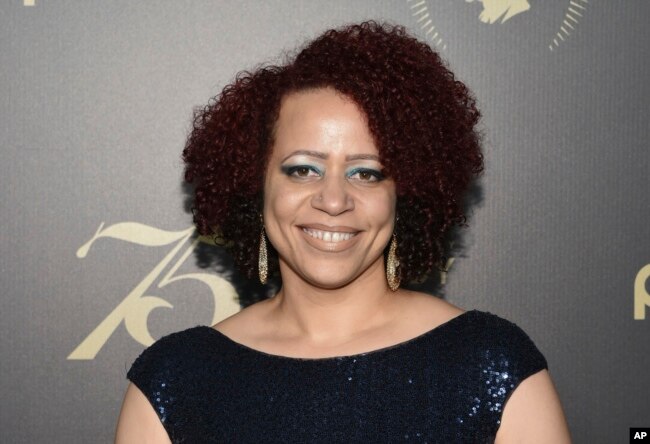重要な国家の歴史教育を考えよう
教育は国家なり。それが持論です。
それは未来のために、です。
歴史を乗り越えたところから、アイデンティティが始まると思います。歴史教育は根深い問題ですがなるべく早く、政治色を排除した教育が未来を語る上にも重要であり、スタートラインだと思います。(我が国のことですが)
VOAですが、さぁ、考えましょう一緒に。
さぁ、勉強しましょう一緒に。
アメリカで人種、奴隷制度の歴史をどう教えるべきか?
How Should the History of Race, Slavery Be Taught in America?
3 hours ago /2021/2/14
アメリカの学校で歴史をどのように教えるべきかは、アメリカの様々な団体によって強引に議論されているテーマです。
現在進行中の論争の一例として、ドナルド・トランプ前大統領の政権による取り組みがあります。それは、奴隷制度や人種を含むアメリカの歴史が公立学校や大学で議論される方法に影響を与えようとしたものです。
2020年11月、トランプ氏は教育省に1776委員会と呼ばれるグループの設立を命じました。その任務は "1776年のアメリカ建国の歴史と原則を、新進世代がよりよく理解できるようにすること "であると述べられています。
しかし、批評家たちは、この委員会がアメリカの建国に貢献した人物 — つまり建国の父として知られる人物について一方的な話をしていると述べましす。彼らは、委員会が学校にアメリカの初期の時代の話をするときに奴隷制度の重要性を減らすように指示したと主張しています。委員会は1月18日に報告書を発表しました。トランプ政権は、この報告書が国内での歴史教育についての指針となることを期待していていました。
しかし、批評家たちは、それが教育の多くの考えを侮辱していると述べています。イェール大学で南北戦争の歴史学者を務めるデビッド・ブライト氏。彼は、トランプ氏の委員会が作成した文書を "右翼のプロパガンダの一部 "と呼んでいます。
1619プロジェクト
オブザーバーは、この報告書がThe 1619 Projectへの回答であるかのようだと指摘します。それは、2019年にニューヨーク・タイムズ紙に掲載された一連の記事です。その記事は、後にアメリカとなるイギリスの植民地に奴隷制度が与えた影響について書かれています。
ニューヨーク・タイムズのコレクションは、歴史家たちが奴隷が最初にアメリカ合衆国になる地域に連れてこられたと考えている年から400年目の節目の年に発売されました。
話は、アフリカの奴隷がいくつかの植民地で無料の労働力を提供する方法について語っています。作家は、奴隷が農業経済を世界で最も生産的なものの一つにしたと主張しました。彼らは、奴隷制度が人種差別と劣悪な条件の数百年の始まりであり、そこから黒人はまだ完全に回復していないと言います。
1619プロジェクトはピューリッツァー賞を受賞し、ポッドキャストになりました。ニューヨーク・タイムズ紙は、奴隷制度がどのようにして "アメリカを真に例外的なものにしたほぼすべてのもの "を始めたかに注目していると述べています。
ジョー・バイデン大統領は、大統領就任初日の1月20日に執行命令で1776年の委員会を取り消しました。しかし、委員会を支持した州の指導者たちは、まだ公立学校の教師や公立大学が奴隷制と人種差別の影響をどのように議論するかに影響を与えたいと考えています。
教師は何を教えるべきか?
ジョージア州では、ある議員が同州の大学システムのリーダーに、教師が”白人特権”についてどのように話すかを調査するよう求めました。白人特権とは、アメリカ社会で白人であることだけで得られる利点を説明するために使われる用語です。
2020年の夏、ジョージ・フロイド氏の死を受けて人種の公平性をめぐる抗議が行われた後、この用語が多く登場しました。彼はミネソタ州ミネアポリスで警察に拘束されている間に死亡した黒人男性です。
ジョージア州の議員たちは、同州の大学システムに白人特権の問題について教授たちに調査を依頼しました。調査を見たノースジョージア大学で教鞭を執るマシュー・ボーディ英語教授は、教授を威嚇するためのものだとし、"高等教育への攻撃 "と呼びました。
議論はジョージア州だけではありません。アーカンソー州やアイオワ州などの州も同じ問題に取り組んでいます。アーカンソー州のマーク・ローリー代表は、奴隷制度を米国の歴史における”暗い汚点”と呼びました。しかし、ニューヨーク・タイムズの連載は、ジョージ・ワシントンやトーマス・ジェファーソンのような奴隷所有者であった建国の父たちの重要性を低下させていると述べています。
ニコール ハンナ‐ジョーンズ氏は、ニューヨーク・タイムズ紙の記者であり、このプロジェクトの生みの親でもあります。彼女によると、ニューヨーク・タイムズの連載は、学校で伝統的に教えられていることを置き換えるものではないといいます。それは奴隷制度から来たものについて考えるように人々に求めることになっています。
何人かの高校教師は、ニューヨーク・タイムズのプロジェクトに沿った教育計画を使って、奴隷制度の新しい理解を生徒に提供しています。ジョナサン・ロジャース氏はアイオワ州で英語の教師をしています。彼は、1619プロジェクトは貴重だと言っています。それは彼の生徒たちが”異なる情報源や代替的なストーリーテリング”について考えるのに役立った、と彼は言います。
オクラホマ州のある提案は、教師が”分裂的な”問題を教えれば、教師は職を失うことになると呼びかけています。サウスダコタ州では、知事が州の予算に100万ドル近くを追加して、学校でアメリカが "世界の歴史の中で最もユニークな国 "であることを教えるようにすることを提案しています。
テイト・リーブス氏はミシシッピ州知事。彼は歴史修正主義と呼ばれるもの、伝統的な歴史の説明を変えることと戦うために 300万ドルの予算を提案しました。 彼は、全米の教師が「この国の例外的な業績よりも アメリカの欠点に注目している」と述べています。
アーカンソー州のアサ・ハッチンソン知事は、学校で教えられていることは、州ではなく親が対処すべきことだと述べています。
How Should the History of Race, Slavery Be Taught in America?
 Ricco Wright poses for a photo on a street painted with a 'Black Lives Matter' message to mark Juneteenth, which commemorates the end of slavery in Texas. (REUTERS/Shannon Stapleton)
Ricco Wright poses for a photo on a street painted with a 'Black Lives Matter' message to mark Juneteenth, which commemorates the end of slavery in Texas. (REUTERS/Shannon Stapleton)
How history should be taught in American schools is a subject forcefully argued by many different American groups.
One example of the ongoing dispute was an effort by the administration of former President Donald Trump. It sought to influence the way American history, including slavery and race, are discussed in public schools and universities.
In November of 2020, Trump ordered the Department of Education to establish a group called the 1776 Commission. Its stated job was to “better enable rising generations to understand the history and principles of the founding of the United States in 1776.”
However, critics said the group told a one-sided story about the men who helped establish the United States — known as the Founding Fathers. They argued the commission told schools to reduce the importance of slavery when telling the story of the early days of the country. The commission released its report on January 18. The Trump administration hoped it would provide guidance about history teaching in the country.
But, critics said it insulted many ideas of education. David Blight is a Civil War historian at Yale University. He called the document produced by Trump’s commission “a piece of right-wing propaganda.”
The 1619 Project
Observers noted that the report seemed to be an answer to The 1619 Project. It is a series of stories published in 2019 in the New York Times newspaper. The stories are about the influence of slavery on the British colonies that would become the United States.
The New York Times collection was released during the 400th anniversary of the year historians believe slaves were first brought to the area that would become the United States.
The stories talked about how African slaves provided free labor in some colonies. The writers argued that slaves made the agricultural economy one of the most productive in the world. They said that slavery began hundreds of years of racism and poor conditions from which Black people have yet to fully recover.
 FILE - In this Saturday, May 21, 2016, file photo, Nikole Hannah-Jones attends the 75th Annual Peabody Awards Ceremony at Cipriani Wall Street in New York. Proposals in Arkansas, Iowa and Mississippi would prohibit schools from using the New York Times' “
FILE - In this Saturday, May 21, 2016, file photo, Nikole Hannah-Jones attends the 75th Annual Peabody Awards Ceremony at Cipriani Wall Street in New York. Proposals in Arkansas, Iowa and Mississippi would prohibit schools from using the New York Times' “
What should teachers teach?
In the state of Georgia a lawmaker asked the leader of the state’s university system to investigate how teachers talk about “white privilege.” White privilege is a term used to describe the advantages that come just from being white in American society.
The term appeared a lot in the summer of 2020 after protests over racial equity took place following the death of George Floyd. He was a Black man who died while being restrained by police in Minneapolis, Minnesota.
Lawmakers in Georgia asked the state university system to survey its professors on the issue of white privilege. English professor Matthew Boedy teaches at the University of North Georgia. He saw the survey. He said it is designed to intimidate professors and called it “an attack on higher education.”
The debate is not only in Georgia. States including Arkansas and Iowa are dealing with the same issues. Representative from Arkansas Mark Lowery called slavery “a dark stain” on U.S. history. But said, the New York Times series reduced the importance of Founding Fathers like George Washington and Thomas Jefferson, who were slave owners.
Nikole Hannah-Jones is a reporter for the New York Times and creator of the project. She said the New York Times series is not supposed to replace what schools traditionally teach. It is supposed to ask people to think about what came from slavery.
Some high school teachers are using the educational plans that go with the New York Times project to provide their students with a new understanding of slavery. Jonathan Rogers is an English teacher in Iowa. He said The 1619 Project is valuable. It helped his students think about “different sources or alternative storytelling,” he said.
One proposal in Oklahoma calls for teachers to lose their jobs if they teach “divisive” issues. In South Dakota, the governor proposed adding almost $1 million to the state’s budget to make sure schools teach that the U.S. is “the most unique nation in the history of the world.”
Tate Reeves is governor of Mississippi. He proposed $3 million to fight against what he called revisionist history, or the changing of traditional historic accounts. He said teachers around the U.S. have placed attention on what he called “America’s shortcomings over the exceptional achievements of this country.”
Arkansas’s governor Asa Hutchinson said what is taught in schools is something that should be dealt with by parents, not by the state.
_______________________________________________________________
Words in This Story
principle –n. a moral rule or belief that helps people know what is right and wrong, and that influences their actions
founding –n. the time when something is established or created for the future
exceptional –adj. unusually good : much better than average
advantages – n. something (such as a good position or condition) that helps to make someone or something better or more likely to succeed than others
survey- v. to ask (many people) a question or a series of questions in order to gather information about what most people do or think about something
intimidate- v. to make (someone) afraid
stain –n. something that causes people to have less respect for someone
alternative –adj. not usual or traditional
unique –adj. used to say that something or someone is unlike anything or anyone else
achievement –n. something that has been done or achieved through effort : a result of hard work